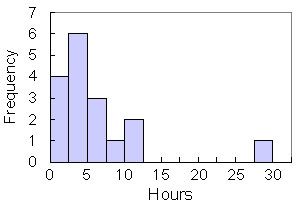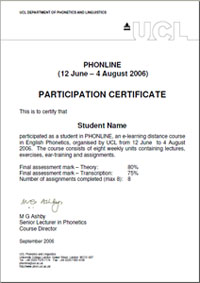DEPARTMENT OF SPEECH, HEARING & PHONETIC SCIENCES UCL Division of Psychology & Language Sciences |
 |
PHONLINE Report
The market
Recruitment and admissions
| The first announcement of the course was made on 12th May 2006, on the website of UCL Department of Phonetics & Linguistics (→ link to announcement) and applications started coming in immediately. We then publicised the course more widely by posting messages to various phonetics-related mailing lists. This brought a huge international response, and applications for enrolment had to be closed on 24th May, 4 days earlier than the originally planned date. By this stage, 147 applications had been received from 40 countries (Figure 1). In terms of phonetic knowledge, 31 applicants classified themselves as advanced learners of phonetics, 96 as having basic knowledge and 20 as having no prior knowledge. | Cumulative application numbers |
An admissions committee was convened to deal with the unexpectedly large number of applications, each of which was carefully evaluated against our stated criteria. Twenty five students were admitted, and a waiting list established. Applicants' details were kept securely in accordance with UCL's Data Protection policies.
Workload and retention rate
Students could log on at their convenience but were expected to spend at least 2 to 3 hours online every week. Results from the evaluation questionnaire confirm that this was a realistic estimate, with the greatest number reporting 2.5 to 5 hours of online study per week.
All 25 participants were successful in logging into PHONLINE at least once, and 24 became regular users. The number of assignment submissions peaked at 22 for week one. A total of 18 persisted till the last unit and 16 progressed to a demanding final assessment, giving an overall retention rate of 64%.
Number of hours on PHONLINE per week (self-reported) |
Number of assignments submitted |
Costs
The pilot of PHONLINE was free to participants. An item in the evaluation questionnaire asked participants how much they would be willing to pay for a course of this type, though it must be recognised that the numbers elicited in this query are likely to be unreliable. Only 4 respondents indicated that they would not have enrolled if there had been any fee, though the other responses are predictably clustered in the lower costing bands offered in the questionnaire item.
The true development costs of PHONLINE include a number of variables which are hard to quantify (especially time on the part of the principal investigators) but were certainly not less than the £15,225 allocated in the original grant. If this original development cost had been recovered from the 25 participants, the necessary fee per student would have been £609, which exceeds participants' own estimates of reasonable costs only by a factor of 2 or 3. There is thus a real prospect that if PHONLINE were run again on a fee-paying basis, a fee could be set which would be acceptable to participants.
Accreditation
The pilot course was not an accredited component of any award, though a participation certificate was issued. We intend to progress towards courses linked to new or existing Certificate awards such as the Certificate of the International Phonetic Association. Other contemplated uses are in conjunction with existing short courses (→ link to SCEP). |
Participation certificate
 |
Back to [Top of page] [PHONLINE Report top]